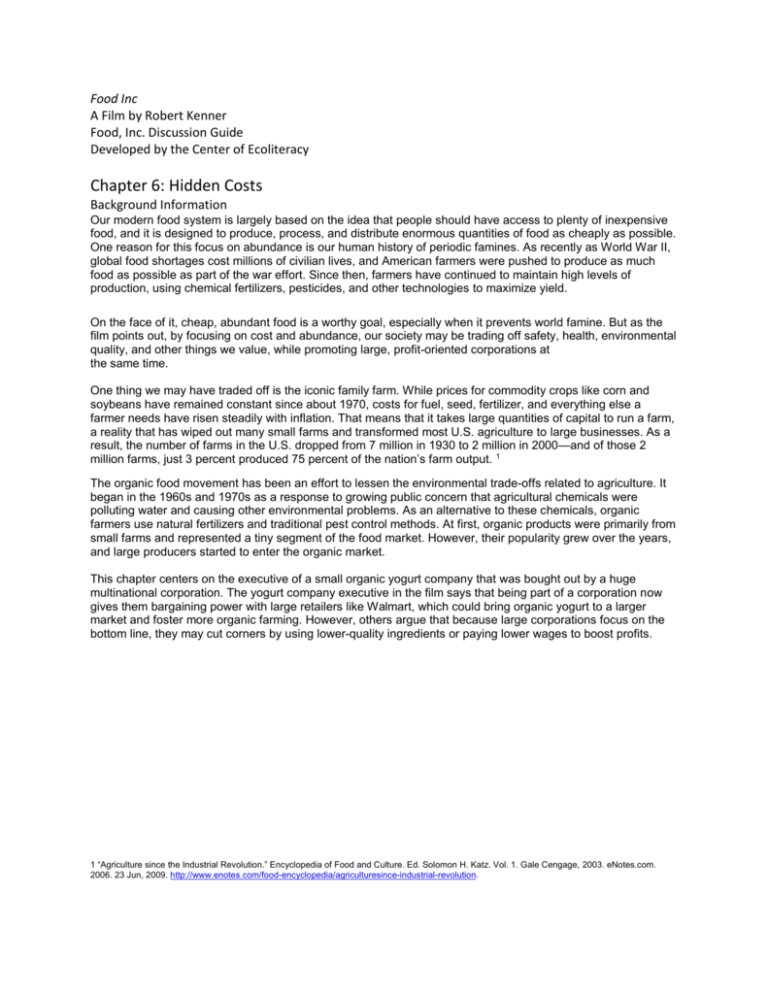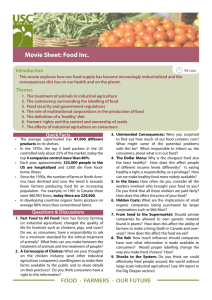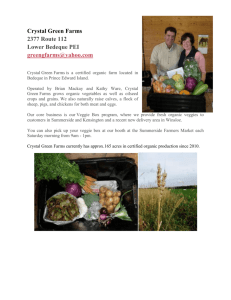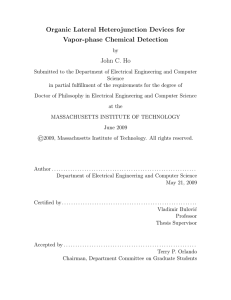File
advertisement

Food Inc A Film by Robert Kenner Food, Inc. Discussion Guide Developed by the Center of Ecoliteracy Chapter 6: Hidden Costs Background Information Our modern food system is largely based on the idea that people should have access to plenty of inexpensive food, and it is designed to produce, process, and distribute enormous quantities of food as cheaply as possible. One reason for this focus on abundance is our human history of periodic famines. As recently as World War II, global food shortages cost millions of civilian lives, and American farmers were pushed to produce as much food as possible as part of the war effort. Since then, farmers have continued to maintain high levels of production, using chemical fertilizers, pesticides, and other technologies to maximize yield. On the face of it, cheap, abundant food is a worthy goal, especially when it prevents world famine. But as the film points out, by focusing on cost and abundance, our society may be trading off safety, health, environmental quality, and other things we value, while promoting large, profit-oriented corporations at the same time. One thing we may have traded off is the iconic family farm. While prices for commodity crops like corn and soybeans have remained constant since about 1970, costs for fuel, seed, fertilizer, and everything else a farmer needs have risen steadily with inflation. That means that it takes large quantities of capital to run a farm, a reality that has wiped out many small farms and transformed most U.S. agriculture to large businesses. As a result, the number of farms in the U.S. dropped from 7 million in 1930 to 2 million in 2000—and of those 2 million farms, just 3 percent produced 75 percent of the nation’s farm output. 1 The organic food movement has been an effort to lessen the environmental trade-offs related to agriculture. It began in the 1960s and 1970s as a response to growing public concern that agricultural chemicals were polluting water and causing other environmental problems. As an alternative to these chemicals, organic farmers use natural fertilizers and traditional pest control methods. At first, organic products were primarily from small farms and represented a tiny segment of the food market. However, their popularity grew over the years, and large producers started to enter the organic market. This chapter centers on the executive of a small organic yogurt company that was bought out by a huge multinational corporation. The yogurt company executive in the film says that being part of a corporation now gives them bargaining power with large retailers like Walmart, which could bring organic yogurt to a larger market and foster more organic farming. However, others argue that because large corporations focus on the bottom line, they may cut corners by using lower-quality ingredients or paying lower wages to boost profits. 1 “Agriculture since the Industrial Revolution.” Encyclopedia of Food and Culture. Ed. Solomon H. Katz. Vol. 1. Gale Cengage, 2003. eNotes.com. 2006. 23 Jun, 2009. http://www.enotes.com/food-encyclopedia/agriculturesince-industrial-revolution. Summary Using the text description and movie viewing, write a summary for the chapter. First, break your summary into its most important components and then compile it into paragraph format. WhoWhatWhenWhereWhyHowSummary Paragraph: Discussion Take a minute to reflect on the following discussion points before participating in the discussion. You can add to your answers before, during and after the discussion. 1. Why might corporations continue marketing the small companies’ products under their original labels, as we saw in the film? What do you think of that practice? 2. As portrayed in the film, cost and efficiency drive our current food system. Should price be the most important force behind our food industry? Why or why not? How might our food system change if it was driven by other values, like health or environmental sustainability? 3. Yogurt company executive Gary Hirshberg says that Walmart started selling organic yogurt not because of a “moral enlightenment,” but for economic reasons. Do you think economics is a good enough reason by itself for companies to make changes that affect our society? Why or why not? 4. What do you think of Gary Hirshberg’s statement that “nobody can challenge the fact that a sale of another million dollars to Walmart helps to save the world”? Do you agree with him? Why or why not? Reflection Now, using the information from the text summary and movie viewing, in correlation with your written summary and group discussion, reflect on the following prompt (min 5 sentences): Place yourself on the following scale: “I’ll buy what I like to eat, no matter who makes it.” 1 “I’ll only buy food from companies Whose values I agree with.” 2 Explain your position (min. 3 sentences). How or has the film affected your perspective? 3 4 5






